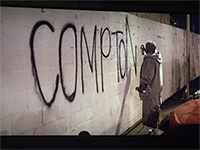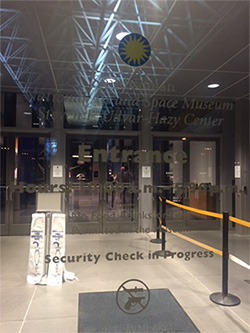Well not really, but Universal has been making a news splash with their new movie, Straight Outta Compton opening this weekend.
Universal Pictures is offering reimbursement for security during the opening weekend of this gang-related rap biopic, as a response to recent theater shootings in Lafayette and Nashville in addition to last week’s verdict for James Holmes’ 2012 attack on the Cinemark Theater in Aurora, Colorado.
The Wall Street Journal reported that, “Protests in Ferguson on Monday night around the anniversary of the shooting of Michael Brown by a police officer prompted more theater operators to sign on to the plan.”
But Universal’s generous offer brings up a very interesting question. If movie studios are willing to provide extra security for their customers, why are theaters hesitating to make that same move to protect their patrons?
Why Won’t Theaters Offer Protection?
The obvious answer is as old as time: Money. While movie studios rake in the money from ticket sales, theaters get only a margin of the film’s profits.
“The film industry will charge movie theaters upwards of 70 percent of the box office revenue,” said Jack Oberleitner, a 55-year veteran of movie theaters, in a 2014 interview with Marketplace.org. “Studios take far and away the biggest chunk of ticket proceeds.”
However, we have seen that families of theater shooting victims hold the theater responsible, not the movie studio. Now that the James Holmes’ trial is over, the civil suits against Cinemark will progress. The lawsuit alleges that the theater should have done more to protect moviegoers where Holmes killed 12 people and wounded 70 others, according to The Denver Post.
The bottom line is that theater owners think increased security is too expensive and would disrupt the enjoyment of moviegoers. It would cost between $250,000 to $1 million annually to maintain a security installation of metal detectors, X-ray machines, screeners and security guards at a multiplex, a security consultant advised. There is even a product that imbeds bullet-resistant panels in the backs of theater seats, which would solve the disruption factor and cost less than a few years’ expense of full-time security.
What has Been Done Since the Aurora Theater Shooting?
After the 2012 attack, The National Association of Theater Owners worked with the Department of Homeland Security to increase security at multiplexes. According to the LA Times, “Theaters were given simple directions, such as to ensure emergency plans were up to date and sensitive areas were properly secured. But, outwardly, not much has changed since then.”
In the same article, Terrell Mayton, director of marketing for Carmike Cinemas, the nation’s fourth-largest circuit, said that the shooting did not warrant a wholesale review of security in theaters.
“We think the security procedures we have in place are effective,’’ he said. “People come to the theater to have fun; you don’t want to give the impression they are the airport.”
While reviewing theater security plans are important, do you think it is enough?
Would you entrust your safety and security to theater workers, a good portion of who are part-time workers and possibly below drinking age? Or, do we need more?
Protecting the Cash Cow
Both movie studios and theater owners profit from movie goers. In turn, both should share the responsibility of keeping theater patrons safe. Wouldn’t they both be adversely affected by people no longer lining up to watch movies in the theaters for fear of unexpected gun violence?
Every week news programs report the millions of dollars the latest blockbuster has made; we hear about the records they broke and which movie they bumped off the top spot. A fraction of these monies could go to bolstering security at the very venues where these companies rake in their profits.
As an avid moviegoer, we need better theater security. While magnetometers and security guards might be an upfront nuisance, it sure beats looking over my shoulder or behind my back during the movie for a possible active shooter or mentally unstable individual with a sharp object. Or worse yet, being killed or injured during my designated time of relaxation and escapism.
upfront nuisance, it sure beats looking over my shoulder or behind my back during the movie for a possible active shooter or mentally unstable individual with a sharp object. Or worse yet, being killed or injured during my designated time of relaxation and escapism.
Recently during opening night of Mission Impossible: Rogue Nation at the Airbus IMAX theatre in the Smithsonian’s Udvar-Hazy Center, I was pleasantly surprised at the level of security. Like many museums, there was a decal on the door barring the possession of guns or knives inside. My bag was also searched by a security guard. It was not disruptive and did make me feel safer. Add in some bullet resistant seats and I am set. Where’s the popcorn?
Pictures of IMAX from the Airbus IMAX Theater in Smithsonian’s National Air and Space Museum, Udvar-Hazy Center in Chantilly, Virginia.
Pictures of Compton from the “HBO First Look: Straight Outta Compton,” the author watched while penning this article! Take a look!